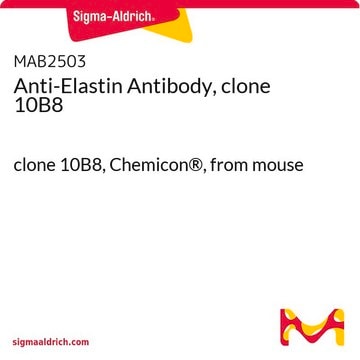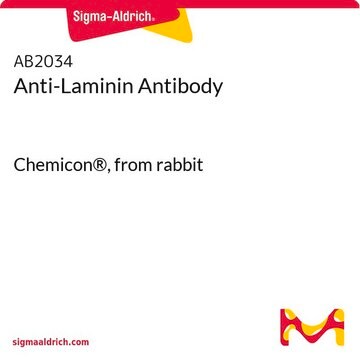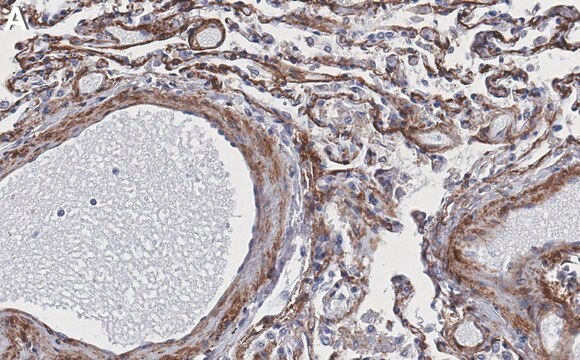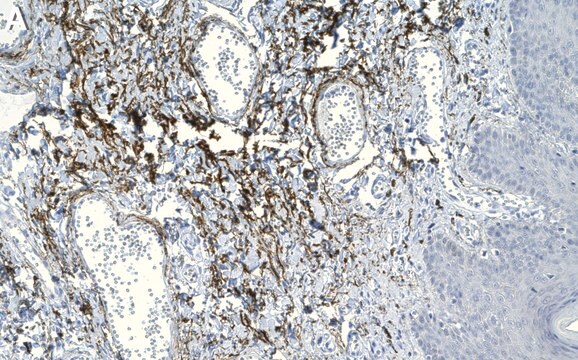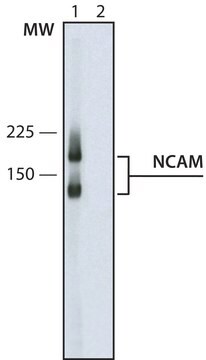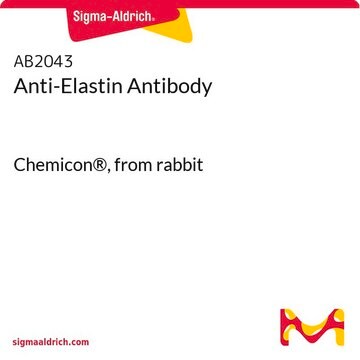추천 제품
생물학적 소스
mouse
Quality Level
결합
unconjugated
항체 형태
ascites fluid
항체 생산 유형
primary antibodies
클론
BA-4, monoclonal
분자량
antigen 67.5 kDa
포함
15 mM sodium azide
종 반응성
human, goat, sheep, guinea pig, pig, canine, feline, bovine
포장
antibody small pack of 25 μL
기술
immunohistochemistry (formalin-fixed, paraffin-embedded sections): 1:5,000 using sheep arterial tissue
microarray: suitable
동형
IgG1
UniProt 수납 번호
배송 상태
dry ice
저장 온도
−20°C
타겟 번역 후 변형
unmodified
유전자 정보
human ... ELN(2006)
일반 설명
Monoclonal Anti-Elastin (mouse IgG1 isotype) is derived from the hybridoma produced by the fusion of mouse myeloma cells and splenocytes from an immunized mouse. Elastin is an important polymeric protein of connective tissue. It is synthesized and secreted as a soluble single-chain protein (tropoelastin) that undergoes numerous post-ribosomal modifications prior to the organization of the elastic fiber in the extracellular space.
특이성
The antibody binds to insoluble elastin, α-elastin, tropoelastin (the soluble non-cross linked precursor of elastin) and to peptide fragments generated by proteolytic digestion of insoluble elastin. In tropoelastin preparations, three immunoreactive bands have been observed at 67.5 kDa, 65 kDa and 62 kDa corresponding to the three elastin isoforms. The antibody is specific for an epitope composed of the repeated sequence in elastin: Val-Gly-Val-Ala-Pro-Gly. This epitope has been shown to be a chemoattractant for fibroblasts and monocytes.
면역원
bovine α-elastin.
애플리케이션
Monoclonal Anti-Elastin antibody produced in mouse has been used in:
- immunohistochemistry
- immunostaining
- immunoblotting
생화학적/생리학적 작용
Elastin is encoded by the ELN gene in humans. It is a polymeric protein in connective tissue that has exceptional properties of extension, elastic recoil to the extracellular matrix and allows many tissues in the body to resume their shape after stretching or contracting. Elastin is a self-assembling, extracellular-matrix protein providing tissue elasticity and is predominantly comprised of cross-linked tropoelastin. It plays an important role in the atherosclerotic process. The conformational disorder is caused due to a constitutive feature of elastin structure and function.
Elastin undergoes changes of morphology with aging and in many disease states. For example, abnormal accumulation of connective tissue in blood vessels contributes to alterations in vascular physiology associated with diseases such as hypertension and atherosclerosis. Several heritable diseases such as Marfan syndrome, pseudoxanthoma elasticum and the Buschke-Ollendorf syndrome may result from molecular defects of elastin.
면책조항
Unless otherwise stated in our catalog or other company documentation accompanying the product(s), our products are intended for research use only and are not to be used for any other purpose, which includes but is not limited to, unauthorized commercial uses, in vitro diagnostic uses, ex vivo or in vivo therapeutic uses or any type of consumption or application to humans or animals.
적합한 제품을 찾을 수 없으신가요?
당사의 제품 선택기 도구.을(를) 시도해 보세요.
Storage Class Code
10 - Combustible liquids
WGK
WGK 3
Flash Point (°F)
Not applicable
Flash Point (°C)
Not applicable
시험 성적서(COA)
제품의 로트/배치 번호를 입력하여 시험 성적서(COA)을 검색하십시오. 로트 및 배치 번호는 제품 라벨에 있는 ‘로트’ 또는 ‘배치’라는 용어 뒤에서 찾을 수 있습니다.
Sean E Reichheld et al.
The Journal of biological chemistry, 289(14), 10057-10068 (2014-02-20)
Elastin is the intrinsically disordered polymeric protein imparting the exceptional properties of extension and elastic recoil to the extracellular matrix of most vertebrates. The monomeric precursor of elastin, tropoelastin, as well as polypeptides containing smaller subsets of the tropoelastin sequence
Exercise training enhances elastin, fibrillin and nitric oxide in the aorta wall of spontaneously hypertensive rats
de Andrade AMTJ, et al.
Experimental and Molecular Pathology, 89(3), 351-357 (2010)
Chae-Eun Yang et al.
International journal of molecular sciences, 21(6) (2020-03-28)
An adenoviral vector (Ad) expressing a Wnt decoy receptor (sLRP6E1E2) is known to induce an anti-fibrotic effect by inhibiting Wnt signaling. We evaluated its effects in vivo using pig models and attempted to introduce an alginate gel-matrix system to prolong
Fabricated elastin
Yeo GC, et al.
Advanced Helathcare Materials, 4(16), 2530-2530 (2015)
Kinon Chen et al.
Annals of biomedical engineering, 42(3), 678-684 (2013-11-16)
Age-related macular degeneration (AMD) etiology is unknown, but its association to atherosclerotic vascular disease (ASVD) has been observed. Since elastin plays an important role in the atherosclerotic process, to understand ASVD and AMD's relationship we examined retinal elastin existence, elastin
자사의 과학자팀은 생명 과학, 재료 과학, 화학 합성, 크로마토그래피, 분석 및 기타 많은 영역을 포함한 모든 과학 분야에 경험이 있습니다..
고객지원팀으로 연락바랍니다.